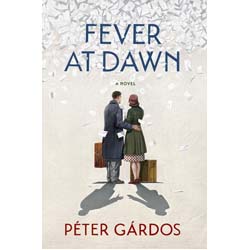 Published: 2016
Published: 2016
Author: Peter Gardos
A fascinating story of survival and love

As regular readers know, the Holocaust is one of my special interests. I’ve read a lot of books – memoir, history, and fiction – set in the period of Nazi rule. The stories of survivors will always move me and books such as Elie Wiesel’s testimony Night and Martin Gilbert’s The Boys, an account of young survivors who came to Britain in the late 1940s, are must reads for anyone with an interest in the period. One facet of survivor experience which I’ve not read about in any detail before is the immediate aftermath of liberation – what happened to people in the weeks and months following their freedom when they were still dangerously ill but no longer prisoners?
In Fever at Dawn, Hungarian author Peter Gardos presents a fictionalised account of his parents’ first months in Sweden and their courtship. His father Miklos is twenty-five and diagnosed with incurable tuberculosis which doctors believe will kill him within six months to a year. He doesn’t have time for the niceties of romance and writes to 117 Hungarian female camp survivors who are also being treated in Sweden. A romance develops with 19 year-old Lilli, but Miklos’s failing health and the desire to protect Lilli seem likely to keep the couple apart.
The most remarkable thing about Fever at Dawn was the focus on a period not much documented – the immediate aftermath of the rescue of survivors including their recuperation. I haven’t read much about that aspect of survivors’ experiences – certainly not in comparison to accounts of experiences in concentration camps. I was struck by the lack of freedom afforded to the survivors – they had come from the worst places imaginable but they weren’t yet free (although they were safe and being cared for). Lilli and Miklos had to ask for permission to travel to visit one another, it seems almost hard to believe – although if we look at the plight of refugees today, perhaps it’s not so difficult to imagine.
I also really appreciated the fact that Gardos didn’t present his parents as particularly heroic or angelic people. Miklos was at times a pretty unlikeable chararcter – particularly at the beginning of the book when he was writing to random female survivors just to find a wife. This rounded portrayal of Miklos and Lilli was much better than a bland characterisation of weak victims.
Fever at Dawn was both a fascinating exploration of the immediate aftermath of the Holocaust and how survivors chose to carry on with their lives, and a touching love story. At times the narrative was desperately moving, particularly Lilli’s attempts to reconnect with her mother. At other times it was warm and funny. A bit like life really.
